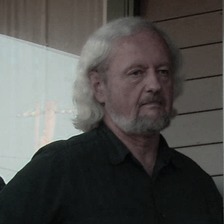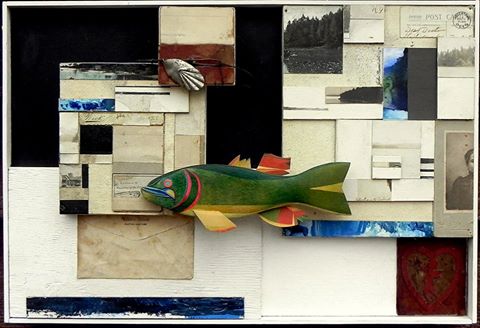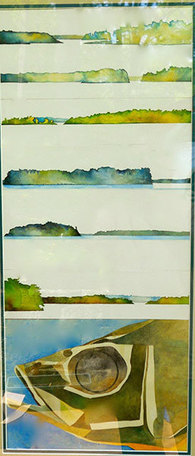 On this Wednesday, March 20, 2019, the soul of one John Elwood Cook crossed the St. Lawrence River to rest, I hope, on some sun-mantled island, surrounded by fat muskellunge and bass, not a single rock bass, priceless acoustic guitars, and beer. John was a family friend and (to fail to avoid the cliche) a formative influence. If you’ve heard me play, the chances are you’ve heard at least one song by John Elwood Cook: Old Country Graveyard, Don’t Rush Me, Memorial Day, Chainsaws and Beer, Dead Man’s Clothes, When the First Snow in the North Country Falls. That’s all John.
On this Wednesday, March 20, 2019, the soul of one John Elwood Cook crossed the St. Lawrence River to rest, I hope, on some sun-mantled island, surrounded by fat muskellunge and bass, not a single rock bass, priceless acoustic guitars, and beer. John was a family friend and (to fail to avoid the cliche) a formative influence. If you’ve heard me play, the chances are you’ve heard at least one song by John Elwood Cook: Old Country Graveyard, Don’t Rush Me, Memorial Day, Chainsaws and Beer, Dead Man’s Clothes, When the First Snow in the North Country Falls. That’s all John.
Here’s a couple of my recordings of John’s songs:
John was a painter, an art teacher, a dealer in vintage American guitars, an antique dealer specialized in fishing tackle, a fish-decoy maker and aficionado, a river man,  a family man, and — most importantly to me — a songwriter. When I was twelve and decided I wanted an acoustic guitar more than an electric, John found me the guitar that I still play today: a 1965 Gibson-made Epiphone Cortez. The last time I saw John was at my grandmother’s post-burial barbeque in Woodgate, NY. He asked me if I still had the guitar. I brought it down and he played it. He admired it and talked about it like it was his greatest find. It had been nearly thirty years since he’d seen it, but he remembered it, and remembered that it wound up with me.
a family man, and — most importantly to me — a songwriter. When I was twelve and decided I wanted an acoustic guitar more than an electric, John found me the guitar that I still play today: a 1965 Gibson-made Epiphone Cortez. The last time I saw John was at my grandmother’s post-burial barbeque in Woodgate, NY. He asked me if I still had the guitar. I brought it down and he played it. He admired it and talked about it like it was his greatest find. It had been nearly thirty years since he’d seen it, but he remembered it, and remembered that it wound up with me.
When I was thirteen or fourteen, my dad broke his usual summer rhythm by bringing me up to the St. Lawrence from Woodgate to let me hang out with him and John. We went out fishing, all day. As we waded by the dock that dusk, John clubbed every fish on the head before its decapitation. We weren’t sure if they felt pain,  but John thought that, in case they did, it was at least better to stun them first. He was a taciturn sort. His humor often presented imitations of the grumpish manner and short sayings of his Northern countrymen. The traits he lampooned were his as well.
but John thought that, in case they did, it was at least better to stun them first. He was a taciturn sort. His humor often presented imitations of the grumpish manner and short sayings of his Northern countrymen. The traits he lampooned were his as well.
We breaded them up with eggs and broken crackers, then fried them in a cast iron pan over a wood fire. We ate the fish in the tiny cabin that John and his wife Judy kept on the shore of the St. Lawrence. That night I watched two grown men play their own songs until they were too tired to play anymore. Some of them were my dad’s, but most of them were John’s, with my dad on mandolin and fiddle.
We Rule the River
The songs were good. I wanted to write songs that good, even if they would only ever be heard by one or two people in a secluded fishing cabin. They were mostly about fishing and beer. One could say, from this ultimate perspective, that John had a few persistent themes over the course of his artistic career: The River. Death. Fish. Painters. Beer. Home. Love. He wrote a lot about the River and Death in the last fifteen years or so of his life. He wasn’t a religious man, but he did his share of preparation. This is all we’re ever gonna have. / This is all we’re ever gonna find. / This is all we’re ever gonna see, / And it’s comin on closin time.
Where Somebody Loved Me
John had a style of hard thumb-picking, finger-brushes, and tightly chosen melodic ornaments. It was a very particular style. He maximized the warmth and frankness of the steel-string guitar in a way that made me love the instrument. He wrote songs like he didn’t know he was doing it. With such an output as he had, it could never be that all the songs were great. His best songs can casually stand with any classic, can play pool with Robert Burns, can sit next to Prine at a bar.
I envy the simple, free, and prolific way that he wrote. I admire the way he wrote and played primarily for his own satisfaction, over the course of an entire lifetime. He often slept until noon because because he’d been singing to himself and a friend or two until four. He was an artist. The song below isn’t one of his best, but it does address the resigned recklessness of his artistic life. At the tomb of the unknown artist / Screwballs stood in line / With absolutely no percentage / In their screwball minds. I don’t know what the rest of the words are about.
At the Tomb of the Unknown Artist
Sometimes I wonder if that trip to the St. Lawrence wasn’t even too momentous for me. Thirty years later I, like John, am a public school teacher. Besides that work — and maybe even a little above it — I care about songs. I sing them for myself and for a few friends. I don’t expect many people to ever hear them, and I really don’t care.
God bless you, John. Thanks for the guitar; thanks for the songs, and thanks for living like you did.
